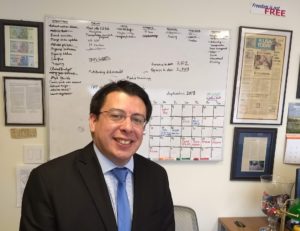This week on The Score – We remember the wild Democratic National Convention of 1968. We discuss a Supreme Court ruling on Internet sales taxes. We hear about NAFTA and trade policy. And we look at on line privacy and government snooping.
http://bearingdrift.com/wp-content/uploads/TheScore-Sep01-2018_fullhour.mp3 [1]Chicago 1968
Fifty years ago this week, the streets of Chicago went up in smoke as thousands of protesters demonstrated against the Vietnam War outside the Democratic National Convention, which nominated Vice President Hubert Humphrey as the party’s candidate for President. Humphrey went on to lose to Richard Nixon in November. The protesters acknowledged their presence on television by chanting: “The whole world is watching,” a phrase that has been repeated in similar circumstances in the five decades since then.
[youtube https://www.youtube.com/watch?v=7_9OJnRnZjU&w=560&h=315]
Another memorable quotation from that convention came from Chicago Mayor Richard Daley, one of the last of the old-time urban political bosses. Confronted about police brutality outside the convention hall, Daley defended his officers by saying [2] “The police are not here to create disorder, they’re here to preserve disorder,” a malapropism that revealed more than its speaker intended.
 I went to the Miller Center for Public Affairs at the University of Virginia to speak to two historians about the significance [3] of the last week of August in 1968. Marc Selverstone [4] and Guian McKee [5] answered my questions, beginning with this: What was the atmosphere like? What were Americans thinking? What were Democrats and Republicans thinking? Guian McKee answers first.
I went to the Miller Center for Public Affairs at the University of Virginia to speak to two historians about the significance [3] of the last week of August in 1968. Marc Selverstone [4] and Guian McKee [5] answered my questions, beginning with this: What was the atmosphere like? What were Americans thinking? What were Democrats and Republicans thinking? Guian McKee answers first.
Selverstone is chair of the Presidential Recordings Program at the Miller Center and author of Constructing the Monolith: The United States, Great Britain, and International Communism, 1945–1950 [6] (2009) and editor of A Companion to John F. Kennedy [7] (2014). McKee works on the Presidential Recordings Program and is co-editor (with Kent B. Germany, David C. Carter, and Timothy Naftali) of The Presidential Recordings: Lyndon B. Johnson: Mississippi Burning and the Passage of the Civil Rights Act: June 1, 1964-July 4, 1964 [8] (2011) as well as author of The Problem of Jobs: Liberalism, Race, and Deindustrialization in Philadelphia [9] (2008 [10]). He can be found on Twitter as @guian_mckee [11].
Taxing Online Purchases
 Coming back to the present, the U.S. Supreme Court, in one of its final decisions of its 2017-2018 term, ruled that the state of South Dakota could collect taxes on sales made over the Internet. The case, South Dakota v. Wayfair [12], overturned a precedent from the pre-Internet era. The opinion was written by Justice Anthony Kennedy, his last one before retirement. The vote was unusual in how the justices lined up together: Kennedy, Clarence Thomas, Ruth Bader Ginsburg, Samuel Alito, and Neil Gorsuch formed the majority; Chief Justice John Roberts wrote a dissenting opinion that was joined by Stephen Breyer, Sonia Sotomayor, and Elena Kagan.
Coming back to the present, the U.S. Supreme Court, in one of its final decisions of its 2017-2018 term, ruled that the state of South Dakota could collect taxes on sales made over the Internet. The case, South Dakota v. Wayfair [12], overturned a precedent from the pre-Internet era. The opinion was written by Justice Anthony Kennedy, his last one before retirement. The vote was unusual in how the justices lined up together: Kennedy, Clarence Thomas, Ruth Bader Ginsburg, Samuel Alito, and Neil Gorsuch formed the majority; Chief Justice John Roberts wrote a dissenting opinion that was joined by Stephen Breyer, Sonia Sotomayor, and Elena Kagan.
I spoke to Joseph Bishop-Henchman at the Tax Foundation in Washington, who explained the decision and how individual consumers will be affected by it. Bishop-Henchman also gives us some background on the Tax Foundation, which was established at the height of the New Deal in 1937, and what it does to influence tax policy at every level of government. The foundation’s executive vice president, Bishop-Henchman is on Twitter as @jbhenchman [13].
Whither Trade Policy?
Trade policy was in the news again this week, as President Trump announced a new trade deal with Mexico and Canada rushed to catch up, so that it’s not left behind as the U.S. government tries to dismantle the quarter-century-old North American Free Trade Agreement.
 I went to the Arlington campus of George Mason University where the Mercatus Center is headquartered. I asked trade policy analyst Daniel Griswold [14] about NAFTA and other related issues, including automobile tariffs [15]. (Did you know that NAFTA can be traced to a 1960s-era initative to integrate the U.S. and Canadian auto industries?) First, I wondered, is President Trump correct when he says NAFTA has been bad for the United States?
I went to the Arlington campus of George Mason University where the Mercatus Center is headquartered. I asked trade policy analyst Daniel Griswold [14] about NAFTA and other related issues, including automobile tariffs [15]. (Did you know that NAFTA can be traced to a 1960s-era initative to integrate the U.S. and Canadian auto industries?) First, I wondered, is President Trump correct when he says NAFTA has been bad for the United States?
Griswold is co-director on the Trade and Immigration Project at the Mercatus Center. He is author of Mad About Trade: Why Main Street America should Embrace Globalization [16] (2009), The Trade-Balance Creed: Debunking the Belief that Imports and Trade Deficits Are a “Drag on Growth” [17] (2011), and co-editor (with Solveig Singleton) of Economic Casualties: How U.S. Foreign Policy Undermines Trade, Growth and Liberty [18] (1999). Follow him on Twitter at @DanielGriswold [19].
Protecting Privacy on Line
Americans have learned to be wary of promises of privacy over the Internet. Facebook has come under increasing scrutiny about what it does with users’ data. In a recent article [20] in The National Interest, Washington-based writer Tyler Grant [21] wrote about his concerns regarding how much information the government can get its hands on from social media companies like Facebook and Twitter.
Grant wrote [22]:
Responding effectively to changing attitudes and improved technology requires Americans to refocus on the principle of the First Amendment—to be more inclusive of speech. To accomplish this, Americans must implement limitations on technology use in the hands of the government. To curtail the government from potential abuses, necessary first steps include setting limitations on the content and duration the government can record and retain data on private citizens with their own government-owned instrumentalities while also creating barriers between private companies and the government from data exchange that would otherwise give improper and excessive information on private citizens.
When tech companies abuse their public forum monopoly, proactive remedies aren’t as clear without undermining a principled approach to the free market. Distancing government from data collection does protect liberty in the short term as market forces often curb corporate malfeasance even by oversized tech companies. The import lies in keeping government out of the business of collecting data on citizens.
I began by asking Grant, one of the stable of commentators from Young Voices Advocates [23], about an item in the news this week: President Trump’s complaint that Google search results for “Trump news” turn up mostly mainstream media like CNN, The Washington Post, and The New York Times rather than conservative outlets like Fox News or Breitbart. The president and his chief economic advisor, Larry Kudlow, warned that government regulation of search engines was under consideration.
Tyler Grant has written for National Review, The Washington Times, The Hill, The Daily Caller, Washington Examiner, The Blaze, The Weekly Standard, Florida Times-Union, Richmond Times-Dispatch, and other publications. Find him on Twitter at @The_Tyler_Grant [24].
Watch this space next week for interviews with Virginia politicians on the campaign trail in Buena Vista [25], for the annual Labor Day festival now in its fifth decade. Last year, no Democrats showed up, so we’ll have to wait until Monday to find out whether the festival is a multipartisan event, as it once was, or limited to Republicans and Libertarians again. Whatever the case, Buena Vista’s Labor Day parade [26] is always fun for the whole family.